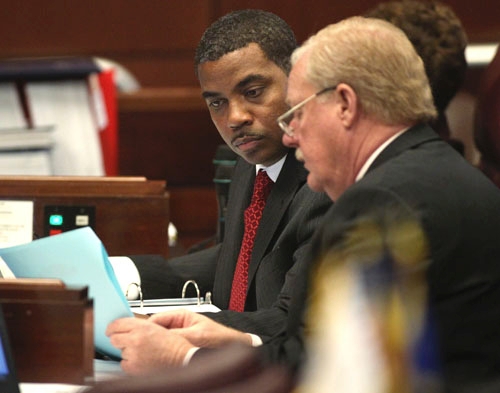Democrats work on fallback tax plan


CARSON CITY — The day after giving up efforts to create new taxes, Democratic lawmakers were working on a fallback plan should their effort to delay the expiration, or sunset, of existing taxes fail as well.
Assembly Speaker John Oceguera, D-Las Vegas, said he’s working on a plan that could put taxes on the ballot, possibly by the end of the year.
“I think that we have made the case new revenue is needed,” Oceguera said. “If we have to do it through the ballot process then that is how we have to do it.”
Although details remain in flux, Oceguera said it’s possible Democrats could push a bill to get the 0.8 percent tax on business margins and the 1 percent service tax on the ballot before the end of the year. Neither tax has the two-thirds bloc of support needed for approval in the Legislature.
It takes only a simple majority, which Democrats have in both chambers, to pass a bill that punts a tax decision to the people.
Republican Gov. Brian Sandoval, who has repeatedly vowed to veto Democratic tax bills, hasn’t said he would veto a bill that would let the people vote on taxes.
“We haven’t discussed the issue,” Sandoval senior policy adviser Dale Erquiaga said.
To get a tax question on the ballot this year would require a general election, perhaps in November. But that would mean shifting some state or local races from even- to odd-year elections or postponing a scheduled Sept. 13 special election for the seat vacated by former Rep. Dean Heller, R-Nev., and having a statewide vote on the taxes.
“That is a possibility,” Oceguera said. “There is some controversy right now that has surfaced as to how special elections are done.”
Secretary of State Ross Miller, a Democrat, said he’s seen several of the proposals and considered how they might work.
“I’ll run the election whenever the Legislature wants me to run it, under whatever rules they decide are appropriate,” Miller said.
The more complicated the logistics get, however, the more opportunities there are for Sandoval to find fault with the idea, especially if it’s viewed as a dodge to get around his opposition to new taxes.
A Sandoval veto would require two-thirds of the Legislature to override and it would be difficult to find Republicans to defy the governor.
State Senate Minority Leader Mike McGinness, R-Fallon, called a ballot question on taxes “terrible policy,” and State Sen. Joe Hardy, R-Boulder City, said “probably not” when asked whether he would support such a plan.
Democratic lawmakers aren’t the only ones cooking up plans to put tax questions on the ballot.
Danny Thompson, executive secretary-treasurer of the Nevada State AFL-CIO, has repeatedly told lawmakers that if the Legislature doesn’t raise taxes to increase spending on education and social services, he would orchestrate a vote by the people.
Still, as the 120-day legislative session grinds toward a 1 a.m. June 7 conclusion, it appears it will be difficult for Democrats to even extend the sunset taxes, which they say would raise about $712 million, a number that includes $69 million in mining tax revenue.
That’s because, so far, Republicans are either refusing to bargain or offering terms Democrats are unwilling to meet.
Oceguera and other Assembly Democrats are working with Republicans in the Assembly to reach agreement on the sunset taxes in exchange for long-term spending reforms.
But even if Oceguera can swing a deal, state Senate Republicans have steadfastly refused to trade reforms for taxes of any kind.
They’ve said they’re fine with Sandoval’s approximately $6.1 billion general fund budget proposal for 2011-13, even though Democrats say it includes too many cuts to education and social services.
“I don’t know how we are closing this budget down without doing (Sandoval’s plan),” Hardy said.
Contact reporter Benjamin Spillman at
bspillman@reviewjournal.com or 702-477-3861.












